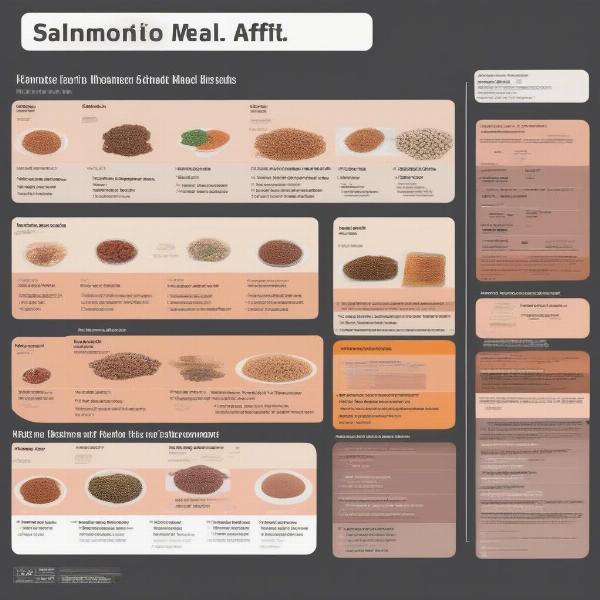Salmon meal is a frequent ingredient in many commercial dog foods, and understanding its benefits and potential drawbacks is crucial for any responsible dog owner. This guide will delve into what salmon meal is, its nutritional value, potential concerns, and how to choose the right dog food containing this ingredient.
What is Salmon Meal?
Salmon meal is a dried and ground product made from leftover parts of salmon after processing for human consumption. This includes bones, heads, tails, and other trimmings. While it might not sound appetizing to us, it’s a concentrated source of nutrients that can benefit our canine companions. It’s important to distinguish salmon meal from salmon oil, which is another valuable supplement derived from salmon.
Nutritional Benefits of Salmon Meal in Dog Food
Salmon meal is packed with essential nutrients vital for a dog’s health. It’s a rich source of high-quality protein, which is crucial for building and repairing tissues, supporting a healthy immune system, and maintaining energy levels. Furthermore, it’s brimming with omega-3 fatty acids, particularly EPA and DHA. These fatty acids contribute to healthy skin and coat, reduce inflammation, support cognitive function, and promote joint health. Salmon meal also provides essential minerals like calcium and phosphorus, vital for strong bones and teeth.
Potential Concerns with Salmon Meal
While generally safe, some potential concerns are associated with salmon meal. One concern revolves around heavy metal contamination, particularly mercury. However, reputable dog food manufacturers adhere to strict regulations and testing procedures to minimize this risk. Another concern is the potential for allergies. While salmon is a less common allergen than other proteins like beef or chicken, some dogs can still develop sensitivities. Always monitor your dog for any signs of allergies, such as skin irritation, digestive upset, or ear infections.
Choosing the Right Dog Food with Salmon Meal
Selecting the best dog food with salmon meal involves careful consideration of several factors. Look for dog foods that list salmon meal as a primary ingredient, ideally within the first few listed. This ensures a higher concentration of the beneficial nutrients. Choose products from reputable brands that prioritize quality ingredients and rigorous testing. Check the label for the Association of American Feed Control Officials (AAFCO) statement, which confirms the food meets nutritional standards.
 Comparing Dog Food Labels with Salmon Meal
Comparing Dog Food Labels with Salmon Meal
Is Salmon Meal Good for Puppies and Senior Dogs?
Yes, salmon meal can benefit dogs of all ages, including puppies and senior dogs. For puppies, the high protein content supports healthy growth and development, while the omega-3s contribute to cognitive development and immune system function. In senior dogs, salmon meal can help maintain muscle mass, support joint health, and improve cognitive function. However, always consult your veterinarian to determine the best diet for your dog’s specific needs, especially if they have pre-existing health conditions.
How to Transition Your Dog to a Salmon Meal Dog Food
Introducing a new food should be done gradually to avoid digestive upset. Start by mixing a small amount of the new salmon meal dog food with your dog’s current food. Gradually increase the proportion of the new food over several days until your dog is eating it exclusively. Monitor your dog for any digestive issues during the transition and consult your veterinarian if necessary.
Conclusion
Salmon meal is a valuable ingredient in dog food, offering a rich source of protein, omega-3 fatty acids, and essential minerals. While potential concerns exist, choosing high-quality products from reputable manufacturers minimizes these risks. By understanding the benefits and potential drawbacks of salmon meal, you can make informed decisions about your dog’s nutrition and contribute to their overall health and well-being.
FAQ
- Is salmon meal better than whole salmon for dogs? Whole salmon is excellent for dogs, but salmon meal provides a more concentrated source of certain nutrients.
- Can salmon meal cause fishy breath in dogs? While it might contribute slightly, fishy breath is often a sign of dental issues and not solely related to salmon meal.
- How much salmon meal should be in dog food? There’s no specific percentage, but it should be listed as a primary ingredient for optimal benefit.
- Is salmon meal sustainable? Reputable manufacturers often source salmon meal from sustainably managed fisheries.
- Can I give my dog salmon meal supplements? Consult your vet before adding any supplements to your dog’s diet.
- What are some signs of a salmon allergy in dogs? Itching, skin redness, gastrointestinal issues, and ear infections are potential signs.
- Is salmon meal safe for dogs with sensitive stomachs? Salmon is generally well-tolerated, but always introduce new foods gradually.
Related Articles
ILM Dog is a leading online resource for dog owners worldwide, providing expert advice on dog breeds, health, training, nutrition, grooming, and much more. We offer practical tips and valuable insights for all dog lovers, from beginners to experienced owners. For personalized guidance on your dog’s nutrition and well-being, contact us via email at [email protected] or by phone at +44 20-3965-8624. ILM Dog is committed to helping you provide the best possible care for your furry companion.